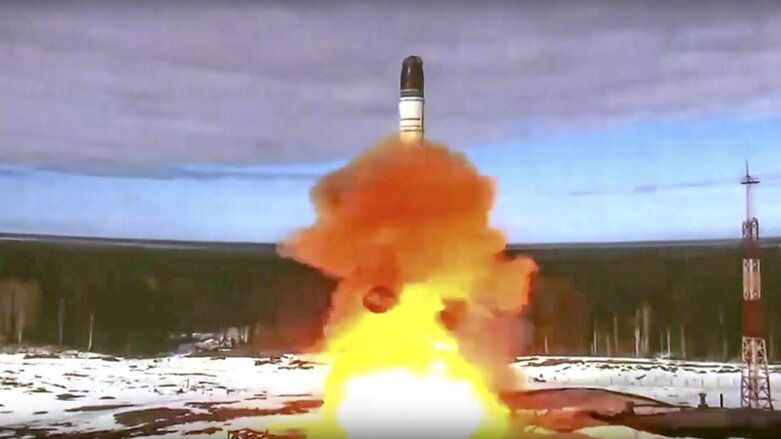Putin threatens with new missile launch, but US dismisses it as ordinary test

WASHINGTON DC (Kurdistan 24) – As the Russian military tested a new intercontinental ballistic missile (ICBM), Russian President Vladimir Putin said the "truly unique weapon" would make Russia's enemies reconsider their hostility to his country.
The White House and Pentagon, however, dismissed the missile launch as routine, explaining that the US had been notified in advance, in accord with the provisions of a 2011 treaty between the US and Russia, known as "New START."
Indeed, as Pentagon Press Secretary John Kirby affirmed, "We were not surprised by it and did not deem it to be a threat to the United States or allies," adding that the Defense Department "remains focused on Russia's unlawful and unprovoked aggression against Ukraine."
The Sarmat Missile and Putin's Threats
Following Wednesday's launch of the RS-28 Sarmat missile, Putin congratulated the Russian military, saying, "It has no analogue in the world and will not have any for a long time to come."
"This truly unique weapon will bolster the combat capabilities of our Armed Forces; will reliably safeguard Russia's security from external threats; and will make those who, in the frenzy of rabid and aggressive rhetoric, are trying to threaten our country, think twice," TASS, the official Russian news agency, quoted Putin as saying.
Putin was clearly referring to those countries which are now supporting Ukraine. Moscow presented the missile as a serious threat to them.
"The Sarmat missile has unique characteristics that allow it to reliably overcome any existing and future missile defense systems," Russia's Defense Ministry claimed, affirming it would "significantly increase the combat power of [Russia's] strategic nuclear forces."
Some major US media, like The Wall Street Journal, described Putin's comments as "his latest nuclear saber-rattling since invading Ukraine."
Shortly before Russia's assault on Ukraine began, Moscow conducted training exercises involving some of its most modern missile systems, the Journal reported. The Sarmat, it was expected, would be launched then, but that did not happen for another two months—until Wednesday.
And back in February, a few days after the missile exercises, on Feb. 24, as the Russian assault on Ukraine began, Putin warned, "Whoever tries to interfere with us, and even more so, to create threats for our country, for our people, should know that Russia's response will be immediate and will lead you to such consequences that you have never experienced in your history."
"We are ready for any development of events," Putin said then. "All necessary decisions in this regard have been made.".
The Sarmat replaces an older missile, the Voevoda, which was designed in 1962, The Washington Post reported. The Sarmat weighs 220 tons and has a longer range, enabling it to fly over the North and South poles "and strike targets anywhere in the world."
Although the Biden administration dismissed the Sarmat and the ominous Russian statements accompanying its test launch as nothing new, critics increasingly complain that the Russian threats are inhibiting the US and NATO more broadly from providing Ukraine the weapons it needs.
In a Wall Street Journal column published early on Wednesday, Daniel Henninger, the Journal's deputy editorial page director, complained that while Biden is ready "to say the Russians are committing genocide in Ukraine," he "won't say his goal there is to defeat Russia or Vladimir Putin."
Why not? "Because the North Atlantic Treaty Organization's rule of thumb for the conflict is not to 'provoke Putin,'" Henninger wrote.
In addition, media and institutions that are more liberal than the Journal are expressing similar concerns.
John Erath, senior policy director for the Center for Arms Control and Non-Proliferation, told the Post in an article published late on Wednesday that Putin's harsh language was more concerning than the missiles themselves.
"We should be very concerned about this practice of making threats as an instrument of Russian policy [that] is gaining currency," Erath said.
Matthew Kroenig, deputy director of the Atlantic Council's Scowcroft Center for Strategy and Security and Professor of Government at Georgetown University, spoke in similar terms.
"Every time Biden says he doesn't want escalations with Russia," Kroenig told the Post, "the strategy is working." Putin "is making us cautious and limiting our activities to try to avoid nuclear war," but "the flip side of that is that he doesn't want a nuclear war either."
